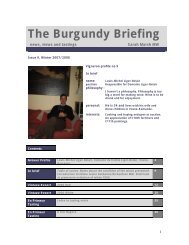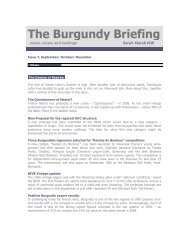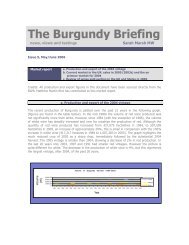The Burgundy Briefing - Sarah Marsh Home Page
The Burgundy Briefing - Sarah Marsh Home Page
The Burgundy Briefing - Sarah Marsh Home Page
- No tags were found...
You also want an ePaper? Increase the reach of your titles
YUMPU automatically turns print PDFs into web optimized ePapers that Google loves.
<strong>The</strong> <strong>Burgundy</strong> <strong>Briefing</strong>news, views and tastings<strong>Sarah</strong> <strong>Marsh</strong> MWIssue 6, July/August 2006Grower ProfileVigneron profile no 6In brief:name: Benoît Droinposition: Responsible for Domaine Jean-Paul &Benoît Droin.philosophy: “To accentuate the typicité of eachindividual wine.”personal: Thirty years old. Lives with his partnerMarie Eugene and their son Louis besidethe wineryinterests:Sport and tasting wine
<strong>The</strong> first changes Benoît made were in thewinery, perhaps not surprisingly forsomeone most drawn to oenology. Hedoes much more analysis than his fatherused to. Jean-Paul worked with anoenologist, which is common practice, butBenoît wanted to do it himself: “I said no,”Thirty year old Benoît Droin is the fourteenth generation of vine growers, in a tradition which haspassed unbroken from father to son since 1625. “For me it was evident I had to continue,” saysDroin. His brother is older, but preferred IT and his eighteen year old sister would like to be intourism. “When I was fifteen I knew I wanted to work at the domaine and represent the nextgeneration. I had to and I wanted to.”As a child he followed his father in the vines until he was fourteen and made an adolescent bidfor independence. “I have a big character and I made a lot of problems for my parents,” headmits. By the age of sixteen however he was studying hard, focusing on biology and chemistryand spent five years until 1996 at the Lycée Viticole in Beaune. “When I was there, I changed alot. I was alone and I studied hard. I wanted to learn more.” He found he was most interested inoenology. “<strong>The</strong> chemistry of wine and the tasting,” interested me. Naturally he progressed toDijon University to do a diploma in oenology.During this period he did a stage with Vincent Dauvissat and then at Laroche. He chose not tostudy outside Chablis, although he appreciates it could have widened his perspective. “I like allthe wine around the world, but wanted to concentrate on Chablis.”He was determined to make his own way and not be unduly influenced by others. This extendedto his relationship with his father, who was there for help if asked, but Droin evidently did notwant a mentor figure. “I preferred to train apart from my father and to stand alone.”Competitive spiritSport has always been important to Droin. His favourite sport was rugby, but after he broke hiscollar bone he moved to football and squash. “I don’t like athletics and running,” he admits. “Ilike team games and I want to win.” He evidently enjoys pitching himself against others andviews this as part of his role as a winemaker. “Twenty years ago there were just a few good wineproducers, now there are many and I want to be at the top with the best. This is a big challengebecause many are good. <strong>The</strong> competition is tough.”In 1998 he left to do national service. “I like the army,” he confesses. “I like their philosophy.”After a year with the Police National in Paris, he feels that the discipline had influenced hischaracter and helped him form his method of working. “To be precise in my organisation.”He admits that it was difficult for both father and son when he returned home in 1999. “For me itwas difficult because everything was new and I had to learn the style of the appellation.” In 1999Jean-Paul handed over to his son. In 2000 there were a few changes, but only in 2002 did Benoîtreally begin to apply his philosophy of winemaking. “My father was very, very open. He said I cando what I want and change it all.” Benoît was keen to instil some order into the process, whichhe found chaotic. Father and son were clearly very different in their approach, but it seems thatBenoît has convinced his father. “He now realises that you gain time from order.” Benoîtmentions that his mother was very important at this time. She helped in the tastings. Jean-Paul’sstyle was different, but together the parents agreed that their son should be allowed to follow hisown style.“To stay at the top, you have to change,” he remarks. His approach is to stay in touch with themarket, but also to be true to his style.<strong>The</strong> winery
Domaine Droin and the old wineryPerhaps the most notable change at Domaine Droin is in the oak regime. This was not somethingBenoît had decided in advance. He liked his father’s wine, which he had always tasted in bottle.However when he began to taste from tank, he realised that he liked the minerality and classicprofile of the domaine’s wine and wanted to preserve it.In the winery now, things are all pretty much as he wants them. He has new pneumatic pressesand new temperature controlled tanks, enabling him to divide the wine into small lots. Six hl isthe smallest. <strong>The</strong> whole harvest can be made in the new winery. Benoît has made otherimprovements including reduced filtering and fining.<strong>The</strong> vineyard<strong>The</strong> domaine currently has 25.5 hectares, an increase from the 19 hectares when he took over.This includes 4 hectares of Montmains - a parcel he began renting from a cousin in 2002. 0.8hectares of Mont de Millieu was added in 2003 together with some new plantings of genericChablis.At first Droin made no changes in the vineyard, busy focusing on pulling the winery into shape.Now he is happy with the winery he feels he can move the wine up a quality level by improvingthe vineyards, specifically Vosgros and Mont de Milleu. His objective is to reduce the vigour andyield of the vines, which he is tackling with debudding, short pruning and cover crops. His fatheris very instrumental in the latter, experimenting with ‘herbes’. <strong>The</strong>se have the added benefit ofhelping combat erosion, compaction and are beneficial after rain in absorbing the water and inleaving the soil more aerated. Jean-Paul has had some success with grasses which don’t needploughing in. All the vines now have cover crops where the tractors are driven, just in the middleof the row - not under the vine, which is bare soil.<strong>The</strong> pruning has been changed to just one baguette or two small canes, which has decreased theyield by 30%. Droin feels the traditional system bunches the canes together and he wantssomething more like Guyot for better aeration and fewer problems with rot. He feels that in 2005the change in pruning and cover crops have had a significant effect on reducing yield. <strong>The</strong>average yield was 50 hl/ha for the Chablis and 40-45 for the premier and grand cru.Droin’s Philosophy
“To accentuate the typicité of each individual wine. So if itis mineral - express it, but if it is not, then to do somethingdifferent. I want to have the extremes; to accentuate thedifferences.”He assesses the soil and exposition of each vineyard andtailors his approach in the winery accordingly. “<strong>The</strong>vineyard changes the winemaking. For example inVaucoupin you are on stone – kimmeridgian, which ismineral and I want to reveal this in the wine so it all goesinto tank and not in barrel. I did this first in 2000 and youcould really see the difference. When I decide to changethe approach it is always a combination of twothings…tasting the wine without oak and seeing thevineyard and the soil.”He does not follow a totally organic approach, but lutte raisonée, which he describes as 80% ofthe way there. “When you respect the soil and the vines you have more life, more bacteria in thesoil,” but he is not interested in certification, preferring the freedom of using a product whennecessary.I wondered if and how he feels he has evolved as a winemaker in the past seven years. Heworries that he is less than he was then. At the beginning he didn’t judge himself and just got onwith things. “Now I always want to be better.” He vacillates between being happy and unhappywith his wine. “It is very difficult work. When you are older some say it is easier, but when youare older you must be better and better. We do strange work. It is a little community and youalways must be good. You don’t appreciate this when you are young. Also when you are young,you don’t imagine you can do badly.” He reflected on the death this year of Denis Mortet,commenting on the expectations of journalists “and colleagues may want to knock you at the top– not for me yet – but I understand the huge pressure from your peers – like showbiz in wine.<strong>The</strong> consumer is the best. <strong>The</strong>y just like wine.”PersonalWeaknesses: “I am too assured sometimes. It is good for competition but not good for me.”(Droin had evidently rallied after the moment of introspection. One gets the impression that anydoubts about his wine are immediately followed by action to address the issue).Strengths: “I am a perfectionist, but I could exchange the two. <strong>The</strong>y are both strengths andweaknesses.”Ambitions: “To make wine which people like. This is not easily evident. You really must keep intouch with what is wanted.”“I always say that if I had to change my job I would prefer not to be a winemaker, but someonetasting and buying wine…the good part of the job. Here you have to do the best that you can,but when you buy, you can taste widely and it is easier to control what you want.”
He lives next to the new winery on the outskirts of Chablis, in a house built for him by hisparents. “It’s important for me to be close.” He has a son, Louis, aged 18 months and his partnerMarie Eugene Tupinier is a lawyer.Main interests outside wine: He admits these are few. When he is not at work he is jet skiing andquad biking, among other sports. He doesn’t like to read or watch television. In fact his maininterest is tasting wine. He meets with a group of friends every week to taste wine blind andhave a meal in a different venue. Some of these friends are winemakers, but as many are not.“Those not in winemaking, are broader minded,” he remarks. He tries to taste as widely aspossible. “At my table it is very rare you will have Chablis.” He likes the whites of Saint Aubin andMeursault and while he likes the reds of the Languedoc, the Rhone and Chile, he loves the redsof Italy, particularly Barbera and Barolo. “It is in my character to like the best and for me thebest whites come <strong>Burgundy</strong>, so in my cellar there is white <strong>Burgundy</strong> and red Italian.”
Droin’s desert island wineLe Montrachet 1960, Domaine Ramonet. “It was a monster and very great.I had it in 1995.”Château Sociando-Mallet, Cru Bourgeois, Haut-Médoc. “I like Bordeauxand this is more Merlot which I prefer this to Cabernet Sauvignon. I wouldlike a 1993.Michele Chiarlo 1988, Barbera d’Asti. “I don’t know if it is a great vintage.I bought it in Paris at a show. <strong>The</strong>y showed me this wine and I though it iswonderful. I said I would like 6 bottles and I had to persuade them to sellme some.”Cluizel Roche, Cote Rotie, 1991 “I love this wine. It was rich and fine. Itwas everything - very complete.”Meursault, Tesson, Domaine Roulot. “I tried a half bottle of 1996, LesTesson. It was very mineral and very rich. <strong>The</strong> kind of wine I like.”Next issue: François Mikulski, Meursault









